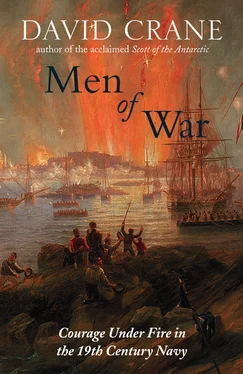his every action is subjected to the narrow views of self-interest alone. Fortunately providence has so ordained it, that moral evils arrived at a certain extent carry with them their own remedy & despotism debases the master even more than the slave; was it not so, despotism once established would be eternal; instead therefore of attributing the success of the Greeks to their Heroism, let us give it its real character, that of the degradation of the Turks.
And in spite of the Greeks, the delays and disappointments at the engine trials – only two of the ships under construction would ever make it out to Greek waters – the last week of May finally saw the completion of Hastings’s Perseverance . Cochrane had originally planned on a grand entrance at the head of a united fleet, but with news of the war worsening with every post and the Perseverance ’s sixty-eight- and thirty-two-pound guns already on their way to Greece, one ship – any ship, almost – was better than the finest fleet the Greek Loan could buy if it was going to languish at Deptford awaiting Mr Galloway’s attentions.
And even if the Perseverance ’s power – ‘forty two horses’ – was ‘feeble’, the engine still defective, and the charismatic Cochrane nowhere to be seen, it was not just any ship that made its ‘unmolested’ way at ‘about six miles an hour’ downriver from her mooring. There might have been nothing new about the sight of such a vessel in the Thames by 1826, but one only has to translate her in the imagination – four hundred tons, 125 feet in length, twenty-five in breadth, paddles churning, tall, thin funnel, set well to the aft, belching smoke – from Deptford to the Gulf of Corinth and the waters beneath Delphi to see Hastings’s vision, in all its barque-rigged, primitive and shocking ugliness, spring into vivid and brutal life.
The mounting of the guns, the alignment of the trunnions, the internal arrangement of the ship, the methods for safely handling and firing hot shot and shell in pitching seas, everything about her, as Finlay put it, was the brainchild not just of Hastings’s strategic vision but of ‘his extraordinary perseverance and energy’. ‘The Karteria,’ Finlay wrote,
which was the name of the Perseverance in the Greek navy, was armed on the principle which Hastings had laid down as necessary to place the Greeks with small vessels on some degree of equality with the line-of-battle ships and large frigates of the Turks: namely, that of using projectiles more destructive than that of the enemy. These projectiles were hot shot and shells, instead of the cold round-shot of the Turks … The Karteria was armed with sixty-eight pounders. Of these she mounted eight; four were carronades of the government pattern, and four were guns of a new form, cast after a model prepared by Hastings himself. These guns were seven feet four inches long in the bore, and weighed fifty-eight hundred-weight.
It was not for nothing, either, that her English name was ‘ Perseverance ’, and long before they reached Gibraltar and the Mediterranean Hastings would need all the reserves of it he could muster. The last time he took a ship downriver from Deptford had been the Kangaroo in 1819, and in spite of fine weather and fair winds the omens for his second command were not promising. The ship sailed well, and he had no complaints with his crew, but ‘There never was a vessel sent to sea with an Engine in so discreditable a condition,’ he complained after it had failed them a fourth time.
From my experience of it I am satisfied we shall have to stop every two or three days to repair it & on our arrival at our destination I fear it will require a month to put into a fit state to go to sea with. The most lamentable incapacity has been shown by Mr Galloway in the conception of a variety of combinations … [some remediable but others not] so colossal that I fear we shall not be able to make the alterations we desire particularly in the paddle wheels, which threaten to come to pieces every other day.
Another fortnight only made things worse – ‘Galloway deserves to be hung, & I would hang him if I had him here’ – and Galloway’s men added further to Hastings’s problems. ‘Our voyage (thanks to Mr Galloway & his) bets fair to be as tedious as that of Ulysses,’ he reported to Hobhouse on 10 July.
The Engine, always defective, stopped altogether about a fortnight ago … The total failure of the Engine has been the work of one of the Engineers [it was common practice for the engine builder to supply two engineers to maintain the machinery] who altered some of the screws of the Larboard side on purpose to ruin the Engine – I never liked taking Galloway’s men after I found them dissatisfied & had almost engaged a man from Taylor & Martin’s which Galloway contrived to prevent. I shall discharge this man here & use my best endeavours.
The death of one of his officers, a Mr Critchley – masquerading under the name of Thompson to protect his naval half-pay – added to the gloom, and it was more than another two months before the Karteria (as she had now become) finally limped into Nauplia. ‘All is confusion here,’ an aggrieved Hastings wrote again to Hobhouse on 5 October, ‘with Athens … blockaded … The Egyptian fleet … expected … with reinforcements … The Greek Government (as I foresaw) [determined] to make a pleasure boat of me for their amusement,’ and Cochrane nowhere to be seen. ‘The absence of Ld C astonishes and mortifies everybody,’ Hastings continued, warming to what would become his favourite theme over the next two years:
for my part I do not know how he can exculpate himself, considering the sum he has locked up & the period he agreed. I expect to get out of this without a sixpence of publick money. The Government has none, & if it had would not give any to me – I have bound myself responsible for three months wages for the Crew, to induce them to embark – (they saw that the Greeks would never pay them). As long as I have any money I will keep the crew together but my own funds will not go far in this, now is it fair that I should ruin myself while Ld Cochrane hanging back as he does is to receive such a sum. I should hope that you would see the propriety & necessity of finding funds for this vessel for at least three months more – then I must take by force part of the revenue of the islands if not given freely, – & what with that, & occasional prizes I hope to keep things afloat for a year or two if the war lasts … Whatever turns up rely upon it I will do my utmost to advance the interests of Greece & should fortune not favour us I will be the last to quit the wreck.
Hastings and the Greeks were not being entirely fair to their absentee admiral – it was not his fault that Galloway went on promising more than he could deliver – but for all their own corruption and greed the Greek government had every right to feel aggrieved. At the end of 1825 they had a theoretical eight warships under construction, but a year later, and £155,000 spent in America alone, they had just one American frigate to show for their money, one unreliable steamer – the next two had proved completely useless, and two more never left the Thames – and a £57,000 admiral who had got no nearer an enemy ship than watching Mohammed Ali’s new Egyptian men-of-war rising on the stocks of the Marseilles dockyards.
There was one small glimmer of hope, when the Marseilles and Paris Philhellene Societies suspended rivalries with London for long enough to buy Cochrane a French brig, the Sauveur , but for the next five months Hastings was on his own. ‘To the Commander of the First American or English vessel that arrives in Greece to join the Greeks,’ he addressed a letter at the end of October, too late in the year to do anything more than prepare the Karteria for the coming campaigning season:
Читать дальше











